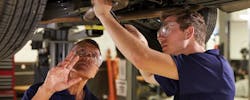Training Day: New Services May Require Staff Training
For the shop owner looking to add some services there is most certainly the usual checklist: does the community need the service? Check. Can the shop be expanded without breaking the bank? Check. Found the right equipment to add? Check. Do the employees have the skills to handle these new services? Wait, what?
That's right. Many shop owners who have expanded services often assume - wrongly as the case may be - that the current staff can transition to the new services that are now offered. In most instances, this is rarely the case.
Employees who work at quick lube shops, even the best of them, aren't necessarily going to be up to the task of performing the services a total car care center typically offers.
"The implication of statement is legion," said Tony Molla, vice president of the Automotive Service Association.
"There are plenty of employees who can handle additional tasks, but a lot depends on the tech in question as to how much of an issue this could be when you add new services," Molla said. "There is quite a leap from opening a drain plug, for those who never worked on cars."
Even when the employees may be "car guys" and do some regular maintenance on their own vehicles, it can still be a challenge to suddenly have to work on the plethora of makes and models that could roll through the doors. Brakes, alignments, transmissions and other auto repairs can be very complex work.
"It would be like running an oil refinery, for example, and then deciding you wanted to open a nursery and grow flowers," Molla explained candidly. "What I'm trying to say is, there is a very different skill set with what can be a very steep learning curve. People go to school for two years to work on vehicles, so it is a lot more than just buying some new equipment and changing the sign out front."
New Hires
Many shop owners may have to face what can be a harsh reality and accept that some employees - again even those who have excelled at their current jobs as lube techs - could find themselves in a job that is much more demanding and challenging."If you want to go into a full-service model, you might have to accept that you'll need to hire a lot of new people," Molla added. "You're going to be faced with having to hire those who can do the jobs."
This isn't to say it is impossible for any lube shop to expand its services, but employees with the skills to run the machines are as crucial as the machines themselves.
"As a shop owner you're going to want to have employees who have passed an ASE test," Molla said. "Certification may not be required, but it doesn't hurt to have employees who know what they are doing."
However, a lot can come down to what services the shop is adding.
"It does depend on what you might think about offering, general service or total auto care is a lot different from adding tires and batteries," Molla said. "But again, all of it is still a lot different, moving beyond the lube shop model."
Importance of Training
Hiring additional staff isn't always in the cards - and certainly may not be in the budget - for many shop owners, especially with new equipment and shop modifications already tapping into cash reserves. Instead, shop owners should look to their managers and top employees before an expansion and determine who is up to the task of handling more and what skills they could learn."Training is paramount if you're going to add services; and education is a must," said David Haney, board member at the Automotive Oil Change Association. "It isn't required, but it is something that is really necessary if you're going to run a safe and successful shop. It is really a good idea to have the employees trained properly on the new equipment. It comes down to this: If you aren't trained, you aren't going to do it right."
Training ensures not only your staff's safety, but also the safety of your customers' vehicles out on the road. Not doing something correctly could cost the shop money or its reputation, but in extreme cases, it could result in serious lawsuits.
One case Haney mentioned to NOLN was about a quick lube shop that didn't even offer tire services. A tech added air to a customer's tires during an oil change, which was noted on the receipt. Later, after the vehicle had a tire blowout resulting in an accident, the shop was held responsible.
"If you're going to do anything with tires, you need to know tires," Haney added. "Otherwise, you're headed into a world of trouble. There is a lot of litigation happening around tires right now."
Before shop owners make the leap into a new service, they should spend some time researching the laws, industry regulations, EPA regulations and other standards associated with the new service.
"You almost need to be part lawyer when adding a new service," Haney admitted. "Because you need to have a handle on what cases are in the courts." Fortunately, there is a lot of help out there. One valuable resource is the Tire Industry Association.
"Groups like these will guide you through the rules, such as how to rotate tires properly," Haney said. "If you do anything differently from those guidelines, you are hanging out in the wind if something happens."
The rules, which can include not repairing a sidewall and not repairing a tire more than three times, are things that most lube techs might not know. It isn't rocket science, but doing the wrong thing can become a major problem.
"If you do the wrong thing, you are playing with fire and will get burned," Haney added. "What you need to remember is that this is a case where the consumer has no accountability for their possessions - in this case, a car - and no matter what they know or don't know, in the eyes of the law, they aren't the expert."
Even trained employees may not always be experts, as all facets of automotive service continue to change and become more complex. One example of this that Haney noted was in how windshield installs have changed.
"I was at a seminar. There was a guy who had been installing windshields for three years, and everything he did was wrong," Haney explained. "He simply learned from the guy who was doing it, and that guy had been installing windshields for 10 years."
Even if those employees had been installing windshields correctly, there's no guarantee that they'd still be doing it right tomorrow.
"In the past four years, we've seen windshields that have added rain sensors, lane sensors to detect other vehicles, heated wiper blades and other features," Haney said. "We're seeing electromagnetic mirrors and forward warning systems. All this has to be calibrated. If you haven't been trained and continued to train in the last four years, you probably aren't doing it right."
To Train or Hire
Whether a shop will hire new employees or opt to train the existing ones is something that should be handled on a case-by-case basis. No two employees are going to be the same, and shop owners need to recognize this fact. Fortunately, there are a lot of options for training."All the spring training events are beginning in March and April," said Daniel Bemiss of Autel. "TST Seminars, Vision Training and I-CAR are all ramping up their training schedule options to support the large groups of shop owners they know are constantly trying to evaluate their new potential business moves."
TST is one option, which is designed to keep automotive service techs up-to-date with the latest technology, while I-CAR offers training opportunities for the collision repair industry. The Vision Hi-Tech Training & Expo is an event that allows shop owners, managers and technicians to experience hands-on and live-car training.
"The shop owner should make the decision to get involved with training based on how new services can be best supported," Bemiss said.
"Right now, training can be a better option, as it is a tight job market, and many members (of the ASA) can't find qualified people," Molla said. "It is possible to train employees, but one thing to remember is that this takes time, and they won't be immediately productive."
Remember, what you do today won't serve you tomorrow. Just as Haney noted with windshields, automobiles are becoming ever more high-tech every year. So, techs are truly going to have to become high-tech.
"A 20-minute study isn't going to be enough to suddenly take on a service," Haney said. "Continuing education is important. There is always going to be something new and something different. The more services you add, the more you and your employees are going to need to know."
About the Author

Peter Suciu
Peter Suciu is Michigan-based writer and NOLN freelance contributor who has contributed to more than four dozen magazines, newspapers and websites. He lives in the land of cars not far from one of Henry Ford's estates.
